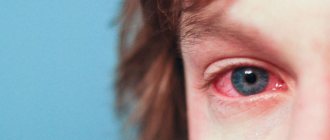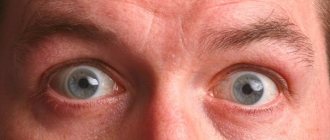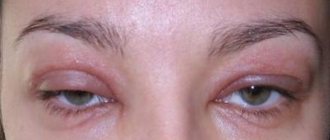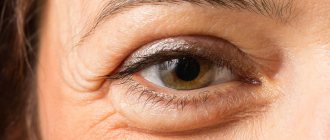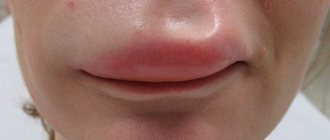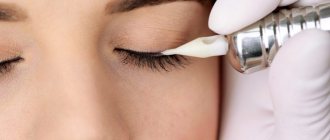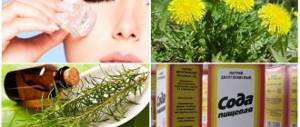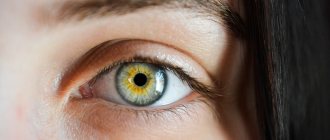Swelling on the face most often bothers women after 30–40 years of age, but they can also appear at a younger age. Swelling is formed when fluid accumulates in the intercellular space. Most women notice swelling in the morning after waking up, but it can also occur in the evening. Swelling of the eyelids and area under the eyes is often caused by lack of sleep or drinking alcohol the night before, and swelling of the entire face, due to which the eyes are almost invisible, can be a manifestation of allergies.
- Drug treatment
How does alcohol affect the body?
Everyone knows that ethyl alcohol has a destructive effect on physical and mental health. Ethanol toxins lead to irreversible changes in all internal human organs. Alcohol also leaves a negative imprint on the appearance of the addict. When ethanol enters the body, it provokes an increase in blood pressure and an increased heart rate. Blood flow accelerates not only in the extremities of the body, but also in the face. If an addict abuses alcohol, then this puts a strong strain on the blood vessels and they become damaged, which provokes the appearance of redness on the skin, by which a drunk person is recognized.
What is Quincke's edema?
A condition in which severe swelling of the subcutaneous fat and mucous membranes occurs is called Quincke's edema. The first to describe this process was the German therapist Heinrich Quincke. This happened at the end of the 19th century. The second name for this phenomenon is angioedema. This is a response to the influence of biological and chemical factors on the human body. A characteristic sign of edema is an increase in the size of the face, which seems to swell. The patient's lips swell, his eyes narrow to slits. Sometimes the pupils are practically invisible. There are many photographs on the Internet showing people with swelling on their eyelids. Outwardly, this state is difficult to confuse with something.
Swelling can also occur in other parts of the body. It usually forms on the neck, arms, and less commonly, limbs. Most often, the swelling is localized on the face, in the eyelid area. Quincke's edema usually appears in people who suffer from allergic diseases. It occurs much more often in children than in adults. This condition very rarely develops in men. Its occurrence in women is more common.
Causes of edema in alcoholics
The body uses large amounts of water to cleanse itself of toxins. The liquid not only participates in the process of decomposition of alcohol into its components, but also washes out all toxins, dead cells remaining after the destruction of blood vessels and nerve endings.
Water-electrolyte balance is very important for the body. If you lose even 5% of water, dehydration occurs. A person experiences extreme thirst and begins to drink water in large quantities. Water absorption occurs slowly and the body often does not have time to properly distribute all the incoming liquid. As a result, a person drinks too much water, and fearing new dehydration, the body stores as much of it as possible in soft tissues.
Drug treatment
Quincke's edema is dangerous because it provokes obstruction of the airway. Hypoxia, which is often one of the signs of this condition, is life-threatening. Therefore, the first thing the doctor must do is to provide the patient with continuous access to oxygen. For this purpose, drugs such as:
- "Prednisolone";
- "Dexamethasone";
- "Adrenalin".
In severe forms of edema, tracheal intubation is permissible - insertion of an endotracheal tube. If necessary, this procedure can be replaced with conicotomy. This manipulation is carried out in emergency cases when the upper respiratory tract stops allowing oxygen to pass through. Treatment with such methods is usually carried out if the patient has lost consciousness.
The administration of antihistamines for swelling of the eyelids is considered mandatory. After the patient’s breathing has been stabilized, doctors proceed to injections. Antihistamines help quickly eliminate swelling on the eyelids and suppress the production of histamine. Intramuscular administration of the following drugs is indicated:
- "Suprastina";
- "Diphenhydramine";
- "Tavegila";
- "Cetirizine";
- "Ruzama."
Potassium chloride, calcium gluconate, sodium thiosulfate, and glucose solution are additionally administered intravenously. Some of them act as sorbents and help remove toxins from the body. An increase in calcium gluconate in the blood helps reduce the symptoms of allergic edema.
How does swelling develop?
The result of this process is most noticeable on the face. Soft tissues are very susceptible to excess fluid in the body. This causes swelling of the eyelids, swelling under the eyes, and puffiness of the face. As the process progresses, swelling spreads to the extremities.
The second reason for the development of swelling is that the liver and kidneys become clogged with toxins. The organs cannot cope with alcohol fully, so the longer the binge, the more pronounced swelling of the soft tissues on the face and limbs becomes apparent.
Causes of swelling on the face
When a large amount of fluid accumulates in the body due to various disorders of the internal organs, excess fluid accumulates and swelling occurs. If, in addition to swelling of the face, severe shortness of breath occurs, this is a symptom of heart disease, and the liver may become enlarged. When bluish swelling appears on the face, this indicates that blood circulation is impaired.
If swelling is localized under the eyes, this indicates kidney disease. Most often they occur early in the morning. With renal pathology, the face and eyelids swell. Edema is distinguished by its wateriness, the skin becomes yellow. A person who has chronic kidney disease may be overweight; the swelling is internal.
Facial swelling occurs when the paranasal sinuses become infected, resulting in problems with lymphatic drainage. When inflammation passes, swelling disappears. Such symptoms are typical for a patient with diabetes, because the body cannot resist infection.
With chronic respiratory diseases, the face swells. In this situation, you cannot use a cold compress; it can cause even more harm. You can get rid of edema by treating the underlying disease and preventing it.
Swelling may occur due to an endocrine disease. As a result, the skin and the tissue under the skin swell greatly because a large amount of mucous tissue accumulates; it suffers from a lack of certain hormones that are produced by the thyroid gland; a person needs to take hormones.
In summer, when it is very hot, the face may swell; to prevent this, it is necessary to hide the cheeks and nose, they are sensitive areas of the face. If a burn occurs, you can relieve swelling with a cold compress, you can use soothing herbs and special creams. It is forbidden to apply oil to the affected face.
How to relieve swelling after alcohol
It is, of course, possible to relieve swelling that has developed due to alcohol abuse. To do this, you need, first of all, to completely give up alcohol.
It is imperative to cleanse the body of ethanol breakdown products and other toxins. To relieve swelling at home, you can take a diuretic and drink various infusions. This will help remove excess fluid from the body. Infusions of chamomile, calendula, and St. John's wort are good options. Green tea with lemon and honey will help remove puffiness under the eyes and relieve a hangover.
In some cases, it is recommended to seek professional help. Detoxification is a medical procedure that helps not only cope with the severe consequences of a hangover or long-term binge drinking, but also relieve swelling. You can undergo a detoxification procedure in a clinic or call a narcologist to your home. Duration from 1 hour to a day, depending on the severity of the condition.
Why does swelling of the eyelid occur?
There are different manifestations of allergies. Many people believe that the most characteristic of them are a runny nose, sneezing, and skin rashes. However, doctors say that itching in the eyes, redness of the conjunctiva, and increased secretion of tear fluid are no less common.
This is due to the fact that the eyes are most vulnerable to allergens. Most microscopic particles that trigger allergic reactions are airborne. They easily settle on the mucous membranes of the eyes. The consequence of this is swelling of the eyelids. When complications occur, the face or throat often swells.
Swollen face in female alcoholics
Women react quite sharply to changes in appearance. Note that metabolism in the female body proceeds differently than in the male body. Thus, dehydration occurs much faster and is more pronounced, since the body’s water supply is less. Accordingly, in women, swelling is more pronounced. To get rid of swelling on the face and limbs, you need not only to give up alcohol, but also to review your diet in favor of healthy foods, and also replenish lost amino acids and nutrients.
If a loved one needs help in combating alcohol addiction, contact. Call the 24-hour hotline and schedule an initial consultation.
First aid for eyelid swelling
Quincke's edema is a condition that can be fatal. Therefore, at the first symptoms, you must immediately call an ambulance. It is necessary to consult a doctor even if the patient seems that allergic swelling of the eyelids does not threaten his life, and the signs are mild. Before the paramedic arrives, the patient must be given first aid.
A person who has swelling of the eyelid should be placed on a bed or sofa. It is necessary to provide access to fresh air, that is, open the windows. If the victim was dressed during the formation of edema, you need to remove his clothes. Chains and other jewelry should also be removed to prevent them from scratching your neck. Quincke's edema of the eyelids often causes stress in the patient. If this happens, then he needs to be reassured and explained that a doctor will arrive soon and provide him with qualified assistance.
Next you need to give an antihistamine. The dose should not exceed the recommended one, so you must follow the instructions. If there is no medicine for allergies, you can drop Naphthyzin into your eyes or nose. This is a vasoconstrictor drug, also effective for swelling. If the reason for the formation of Quincke's edema on the eyelids is unknown, all possible irritants should be removed. In the absence of antihistamines, you can give the patient several tablets of activated carbon. It is better to dissolve them in water first. Coal can be replaced with Polysorb sorbent.
If swelling in the eyelid occurs after intramuscular injection of a drug or an insect bite, then the patient needs to apply a tourniquet or a pressure bandage. If this is not possible, a cold compress should be applied to the affected area. This will help slow down the spread of the allergen due to vasoconstriction.
Quincke's edema is hereditary. Treatment
The hereditary form of eyelid edema is treated in other ways. With a genetic predisposition, swelling develops slowly. Symptoms of this condition increase over the course of a day and often go away on their own. Sometimes swelling of the eyelid persists for several days. Quincke's edema of hereditary etiology usually occurs several times a year. In severe cases, this can happen up to 3-4 times a week.
If eyelid edema occurs due to a hereditary pathology and periodically recurs, doctors prescribe prophylactic medications to prevent its development. The following drugs are used in therapy:
- C1 esterase inhibitors (Berinert, Haegarda);
- androgens (Stanazol, Strombafort, Danazol);
- antifibrinolytic agents (Aprotinin, Tranexam, Kontrikal).
Doctors do not always prescribe such treatment. Typically, therapy is carried out when health deteriorates and allergic attacks become more frequent. The use of these drugs is recommended before surgical interventions, dental treatment, and increased physical and mental stress.

